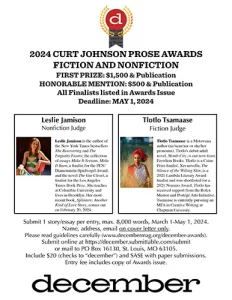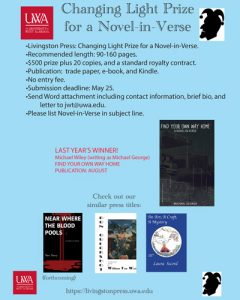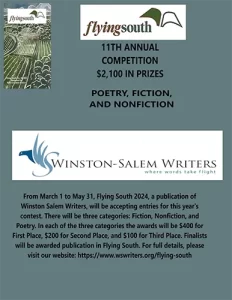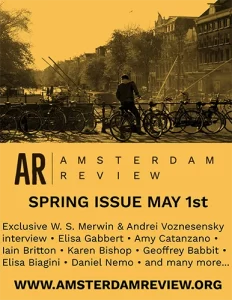Mare Nostrum – June 2006 – May 2008
Volume 5
June 2006 - May 2008
Annual
Terri Denton
In this volume of Mare Nostrum, poems, prose, translation, and reviews are inspired by the traveling exhibit, to Seattle, of Florentine art restored after a 1966 flood. Each piece here is lively and deserving of praise, and has a prominent sense of belonging within these pages. The reader gets a glimpse of this in editor Kevin Craft’s foreword. To wit, “Seeing them restored was like witnessing the first gleam of the Renaissance all over again – the emergence, literally, of perspective as a compositional axiom, of naturalism in the fine shades of feeling etched into each attentive figure.” And, like art itself, the pieces here are both alluringly ambiguous, and wrought with imagination that begs to be understood.
In this volume of Mare Nostrum, poems, prose, translation, and reviews are inspired by the traveling exhibit, to Seattle, of Florentine art restored after a 1966 flood. Each piece here is lively and deserving of praise, and has a prominent sense of belonging within these pages. The reader gets a glimpse of this in editor Kevin Craft’s foreword. To wit, “Seeing them restored was like witnessing the first gleam of the Renaissance all over again – the emergence, literally, of perspective as a compositional axiom, of naturalism in the fine shades of feeling etched into each attentive figure.” And, like art itself, the pieces here are both alluringly ambiguous, and wrought with imagination that begs to be understood.
One of the opening poems depicts this juxtaposition perfectly. Susan Parr’s “Doorknob with Carved Adonis” is a talented writer’s exploration of the tease that art often is. She writes, “What reason he gives this time / for his errand is not developed / in the layout. We feel, turning // the knob, only the ellipsis.” The rest of the poem is confirmation of Parr’s lovely writing. I adored it.
Hannah Sanghee Park’s “Three Churches” is a continuation of literary gift. In part I, Park writes, “Isaiah: Light – an alphabet of cracks / Across his robe, a beard that wasn’t there / Before, his scroll – a curl of words, the crux.” In part III, she concludes this majesty with, “The boa, apple – give a thing a name // Or ten – it’s all an image at its bones. / Like Lucifer – to carry light – a cup / Of light. A third of stars shot down past earth.” I’ll not spoil the entire poem by showing you part II, but know that it’s as gorgeous as parts III and I.
Park, again, shows her literary genius with “Last Museum”:
It’s like
Poseidon had in him, a whim
A wand, a shell, a scale, a tentacle,
And poof!
What has a lot of legs, a lot of eyes,
What struggles to escape?
A Grecian urn,
or spiders filing for divorce. The joke
Is that this three-way fight can be a hoax.
They could just be celebrating…
Her words here are a downright dare – just try not to smile. It’s hard for me not to include the entire poem – its delight is so overpowering
Brandon Krieg’s “Restoration” is another jewel in this collection of treasures. Perhaps a more somber acknowledgement of what is lost in both destruction and restoration, it is no less a joy to read: “This sword held a poem from handle to hilt, / now it shines so you see your own face. / That goddess was three feet taller when built, / now she barely reaches your waist.”
Mischa Willet’s “The Help,” another pearl, seems to offer a wink with its curtsy.
Since the angel offered
the bowl of holy water
like a tray of sweet –
meats at a cocktail gathering
she was – ahem – hosting,
I took one, by which I mean some
as if chestnuts were a-roasting.
Rod Jellema throws his own flair into the poetic fray with an observation of the sense of astonishment one feels when faced with ancient artistry. In “Life-Size Glass Swan: A Study in Stasis,” he writes, “Nothing I have ever touched / could hold the trajectories / of these smooth bends of shine / and wet, this swanness, / blown in glass two centuries ago.”
Lest you think this edition of Mare Nostrum offers up only wonderfully wrought pieces of observational fun, there are, too, examples of serious profundity that deepen as they flow. Set in Italy itself, there are two pieces, in particular, that touched me deeply. First is Geoffrey Brock’s “Landscapes that can’t be Trusted.” With a nod toward the deceit of sight, he writes, “The bed of clouds / that met our feet // as the dark rose / on Mount Capanne. // The high noon sun / stirring the river // of asphalt stretching / between us now.”
Finally, Stanley Plumly’s “Limited Sight Distance,” one of two pieces of prose that appear in this edition, starts off with his residence in an Italian villa. Beautifully written, Plumly observes, “Veduta means view in Italian, and from top to bottom, from the villa on down to the village itself, and from the tops of the cobblestone streets to the diamonds of the lake the view is everywhere, from every moment … You could lose your balance stopping and looking too long.” As the story continues, we realize that it’s September 11, 2001, and the author has arrived at the village only to find himself staring at all-too-familiar and horrifying scenes of destruction.
Here, too, are delightful translations of Italian poets, with the perfect effect of having the original and the modern on facing pages. Coming near the end of this edition pages, they seem the appropriate end for the tribute to Italy that this Mare Nostrum is.
As I finished reading this issue, Craft’s editorial words came back to me: “Here is a threshold that will travel to meet you, where ancient and modern comingle and time, as physicists say, time never begins, until (the maker adds) it enters into word and hinge and flesh.” The introduction fulfills its promise on every page.
[www.writinwaterpress.com/]




